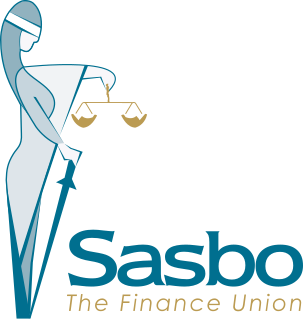Related Research Articles

SASBO – The Finance Union is a trade union in South Africa. It was founded in 1916 and has a membership of 70,000.
Trade unions in South Africa has a history dating back to the 1880s. From the beginning unions could be viewed as a reflection of the racial disunity of the country, with the earliest unions being predominantly for white workers. Through the turbulent years of 1948–1991 trade unions played an important part in developing political and economic resistance, and eventually were one of the driving forces in realising the transition to an inclusive democratic government.
The South African Congress of Trade Unions (SACTU) was a national trade union federation in South Africa.
The Trade Union Council of South Africa (TUCSA) was national trade union federation in South Africa.
The Amalgamated Engineering Union of South Africa (AEU) was a trade union representing white manufacturing workers in South Africa.
The Garment Workers' Union of the Western Province (GWU-WP) was a trade union representing workers in the clothing industry in the Western Cape Province of South Africa.
The Motor Industry Combined Workers' Union (MICWU) was a trade union representing workers in vehicle manufacturing and servicing, and also petrol attendants, in South Africa.
The South African Confederation of Labour (SACOL) was a national trade union federation of white workers in South Africa.
The Federation of Free African Trade Unions of South Africa (FOFATUSA) was a national trade union federation for unions representing black workers in South Africa.
The National Union of Furniture and Allied Workers (NUFAW) is a trade union representing workers in the furniture industry in South Africa.
The South African Federation of Trade Unions (SAFTU) was a national trade union federation of workers representing workers in South Africa.
The South African Footplate Staff Association (SAFSA) was a trade union representing white railway workers in South Africa.
The Amalgamated Union of Building Trade Workers of South Africa (AUBTWSA) is a trade union representing workers in the construction industry in South Africa.
The Building, Construction and Allied Workers' Union (BCAWU) is a trade union representing workers in the construction industry in South Africa.
The Sweet Workers' Union (SWU) was a small but long-lived union representing confectionery workers in South Africa.
The Durban Indian Municipal Employees' Society (DIMES) was a trade union representing municipal workers of Indian origin, in Durban in South Africa.
The Engineering Industrial Workers' Union (EIWU) was a trade union representing engineering workers in South Africa.
The South African Equity Workers' Association (SAEWA) is a general union in South Africa.
The Hospitality Industry and Allied Workers' Union (HIAWU) is a trade union representing workers in the hospitality sector in South Africa.
The South African Railways and Harbours Employees' Union (SAR&HEU) was a trade union representing lower-paid white workers on the railways in South Africa.
References
- ↑ Grant, William (1953). Labour Relations in the Motor Industry in the Western Province (PDF). Cape Town: University of Cape Town. Retrieved 2 May 2021.
- ↑ Alexander, Peter (2000). Workers, War & the Origins of Apartheid. J. Currey. ISBN 9780852557655.
- ↑ Lewis, Jon (1984). Industrialisation and Trade Union Organization in South Africa, 1924-1955. Cambridge: Cambridge University Press. ISBN 0521263123.
- ↑ Monaisa, Chere (2017). Trade Unions in Transformation (PDF). Friedrich Ebert Stiftung. Retrieved 7 March 2021.
- ↑ Wirtz, W. Willard (1962). Directory of Labor Organizations: Africa. Washington DC: Bureau of International Labor Affairs. pp. 37.14–37.25.
- ↑ Miller, Shirley (1982). Trade Unions in South Africa 1970-1980: a directory and statistics. Cape Town: Southern Africa Labour and Development Research Unit. ISBN 0799204692.
- ↑ Johnston, Stuart (28 May 2011). "MISA calls for co-ordinated skills programme" (PDF). AutoLive. No. 1. Retrieved 1 April 2021.